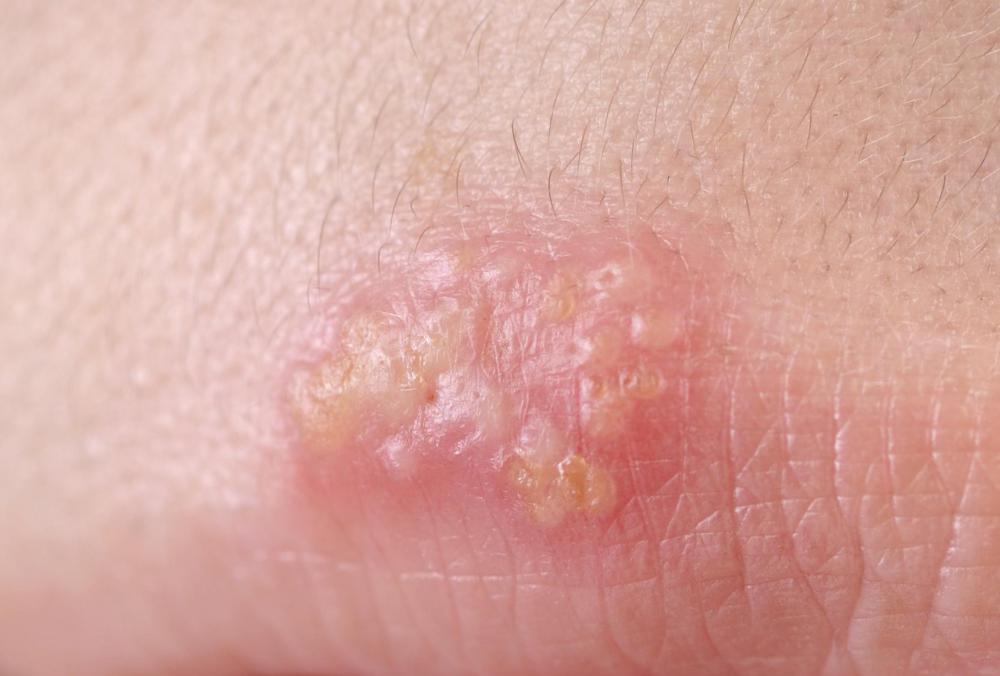At TheHealthBoard, we're committed to delivering accurate, trustworthy information. Our expert-authored content is rigorously fact-checked and sourced from credible authorities. Discover how we uphold the highest standards in providing you with reliable knowledge.
Is It Possible to Transmit Herpes through Saliva?
It is possible to spread herpes through saliva, and the chances of doing so depend greatly on the situation. Despite the fact that most people associate herpes with a genital infection, oral herpes is not considered to be a sexually transmitted disease. In fact, there are many ways to transmit herpes via saliva other than sexual activity. A diagnosis of oral herpes should not necessarily lead one the conclusion that the infected person was behaving recklessly.
In order to transmit herpes through saliva, the virus must be present in the saliva of a carrier, and come into contact with the broken skin or mucous membranes of another person. The oral herpes virus, known as HSV-1, can spread in a number of ways, including simply via the droplets of moisture that leave as a person exhales. Those droplets of saliva can land on a cut or mucous membrane of another person, and start an infection. The two people do not even need to have any direct physical contact.

While the above example is an extreme case, it can happen. More likely, herpes through saliva happens as a result of kissing. Those who kiss others during a herpes outbreak especially risk spreading the infection. It is even possible to spread the virus when an outbreak is not taking place, but it may be harder to do at that point.
Genital herpes is a significantly different, but related, virus, and referred to as HSV-2. Despite the difference, it is still possible to spread oral herpes through saliva from the mouth to another individual's genitals. Once rare, doctors are now reporting it is increasingly common to see HSV-1 infecting genital regions.

Preventing the spread of herpes involves taking some precautions. Those who know they are infected with the disease should not simply assume there are times when they are safe from spreading it. Abstaining from activities such as kissing and oral sex are the only sure ways to avoid spreading the disease. Still, taking some precautions, such as not engaging in those activities during outbreaks, can help reduce, but not eliminate, the chance of spreading the disease.

Those who feel they may have contracted herpes, either through saliva or some other means, should contact a medical professional. Only a medical professional can make the proper diagnosis and suggest a course of treatment. While herpes is not usually life threatening, it can greatly affect a person's quality of life, and therefore taking control of the situation early can be a big help.
AS FEATURED ON:
AS FEATURED ON:















Discussion Comments
I have just been diagnosed with genital herpes and want to know if I could spread it through fighting like ufc type fights.
For herpes to be transmitted there has to be direct contact between the virus and a damaged location on the skin or a mucous membrane. A damaged skin location can be a micro abrasion so small to see or feel.
Yes, herpes can be transmitted through saliva if the virus is active at the time, regardless of whether there are open sores or not. Either HSV1 or HSV2 can be transmitted through saliva, however HSV2 infections in the oral region are more rare and they are less likely to become active or recur, so the chances of transmitting HSV2 through saliva is lower in that sense.
If either HSV1 or HSV2 is active in the saliva, the risk of them being transmitted is pretty much the same.
In general, women are more susceptible to HSV infections than men, or more accurately, men are more likely to infect woman than the other around. Because a woman has more mucous membrane surface area exposed during oral sex, then she is more likely to be infected. But men can be infected as well. And either sex can have a micro abrasion present that would make them equally susceptible to an infection.
HSV1 now accounts for up to 50 percent of new genital herpes infections, this is likely the result of increases oral sex activities among the young adult population.
Can someone who has oral herpes transmit the virus to another part of their body through saliva?
Can someone be infected twice?
@burcidi-- I think this is also largely dependent on the type of herpes a person has and how long they've had it for. As far as I know, type 1 herpes (HSV 1), is most infectious in the first several weeks the person has been infected. If it's type 2 herpes (HSV 2), I think that's harder to transmit than type 1 because it doesn't cause sores in the mouth.
So it's not really possible to know what the risks are unless you go to a doctor and are diagnosed with one of these types of herpes and know how long you've had it for.
Of course it's possible to transmit herpes through saliva in oral sex, but it really depends on the specific situation. People try to self-diagnose themselves and that's the problem. A visit to a doctor and a few tests can clear this up.
Also, does anyone know if women or men more likely to get herpes through saliva on the genitals? For example, is a woman more susceptible to getting the virus than a man is with oral sex?
Post your comments